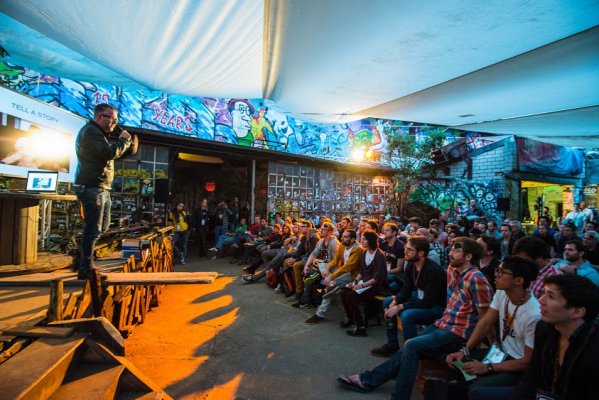On Wednesday I had the unique pleasure of hanging out with a bunch of Macedonian startup founders and was very impressed. The Balkans have long been a promising spot for startups – the cost of living is low and the talent level is high – and this visit was unique in that everyone was fully prepared to pitch on a global scale.
The winners of the pitch-off were Letz, a cool chatbot that won a Best Technology Product award on Product Hunt and TakeAnAd which makes it easy to capture and post Facebook ads. One of the judges came from Grouper, a shopping app that single-handedly brought online shopping penetration from 1% to nearly 100% in less than a decade.
In short, these were some solid ideas and they were working hard to push things forward.
The most interesting thing I’ve noticed over the past few years is the spread of the “theatre of entrepreneurship” – the ability for young people to pound out excellent two minute pitches in harsh environments. This means a few things. First it shows that these techniques are truly global – the same can be said of folks in Skopje as it can be of folks in Skokie. Further, it means that cool things are everywhere.
The biggest problem for these places is seed capital. I’ve spoken to a number of investors from various cities who offer a bunch of hand-waving and wiggling as they explain that they only do see rounds in companies in their back yards or with plenty of traction. I would argue that companies in markets outside of New York, LA, SF, Berlin, and London – companies situated in places where offices are $850 a month and salaries are comparably low – could produce some real winners more consistently if they had access to small injections of capital early on. VCs, on the other hand, want to see growth and revenue and they want to be able to bike to the startup offices which means a kid from Skopje has to be shelling out a few thousand a month to satisfy the whims of a professional No-man.
There are small funds trying their damnedest to help and they envision a time when their smaller markets will become true farm teams for global reach.
Will this happen? No. The stewardship of capital is too important to a dude in Palo Alto to consider dumping it in Zagreb. The risks of dropping cash in Warsaw – which we could argue are minimal – are too great for a post-Brexit Londoner. The only answer it sees is for these small markets to send their best and brightest to accelerators in the Valley and hope for the best although I would argue that a programmer situated nicely in Skopje with a cheap apartment and a great quality of life is going to be a longer-lasting employee than one who lands in SFO from Tirana, lives in a squat with five other people to work on a product, and then gives up and works for Google.
Of course I’m being needlessly cynical. After all, as evidenced by the teams that pitched, these companies are easily able to fend for themselves, with or without investment. But a shot in the arm and a pat on the back could definitely help.
The challenges facing folks in Skopje and Belgrade and Warsaw and Vienna are not small. In a culture that rewarded career longevity, pensions, and a retirement at the dacha the idea that you would eschew a cubicle at Citibank is akin to blasphemy. It takes guts to get up and pitch in English and it takes guts to fight for every ounce of cash and it takes guts to succeed even in your little corner of the world. This effort should be rewarded with appreciation, support, and education. I’m not yet sure it is, obviously, but we’re getting there.
